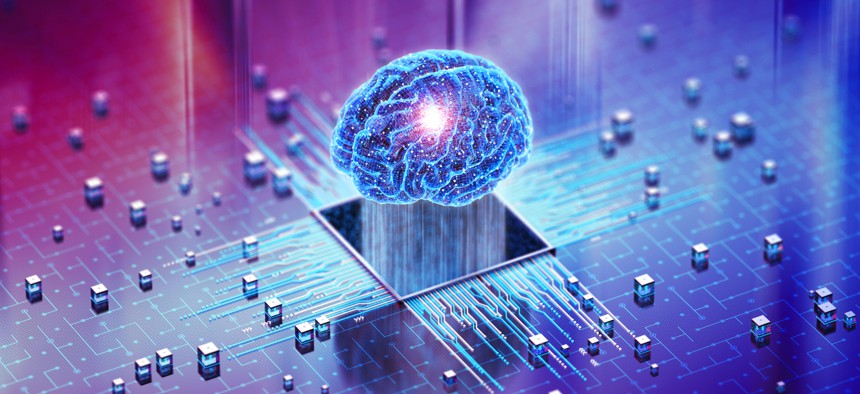White House and DARPA challenge innovators to bring AI tools to cyber defense

BlackJack3D/Getty Images
The AI Cyber Challenge asks leading companies to develop advanced AI systems that will contribute to critical infrastructure cybersecurity — with nearly $20 million available in prizes.
In the latest step towards harnessing the power of artificial intelligence for public good, the Biden administration is launching a new, two-year competition between some of the leading AI software companies to develop new code to protect the digital networks of critical infrastructures nationwide.
Led by the Defense Advanced Research Projects Agency, the “AI Cyber Challenge” competition partners with companies — including Google, Microsoft, Anthropic and OpenAI — to leverage advanced AI algorithmic capabilities for national cybersecurity.
The prizes for this competition total about $20 million, and will be awarded to the teams with the best systems.
“AI is the most powerful technology of our time, and we have to get it right for the American people,” Arati Prabharker, director of the White House Office of Science and Technology Policy, told reporters on Tuesday. “That means managing its risks and it means harnessing its tremendous potential.”
Prabharker added that this is a pivotal example of how the public and private sectors can collaborate on national security projects for mutual benefit. Ann Neuberger, the deputy national security advisor for cyber and emerging technology, added this challenge is “critical” and marries automatic software security with AI to quickly identify and remedy network vulnerabilities.
“With this new challenge, teams will now have the power of modern AI to work through these complicated problems in support of our national security,” she said. “This challenge will help us stay ahead in the race against our adversaries’ cyber offensive capabilities. Because fundamentally, there is no national security without cybersecurity.”
While the competition involves larger tech firms, DARPA will also fund seven small businesses with up to $1 million to participate in the competition’s initial phase. Perri Adams, the DARPA program manager for the AI Cyber Challenge, confirmed that the qualifying event will take place in spring 2024, with the top 20 candidates participating.
From there, the remaining top five semi-finalists will be chosen to participate in the final competition at DEFCON in 2025.
“This is a chance to explore what's possible when experts in cybersecurity and AI have access to a suite of cross-company resources of combined, unprecedented caliber,” Adams said.
The AICC will collaborate with the Open Source Security Foundation, the latter of whom will serve as a challenge advisor. Adams said the collaboration is due to the importance of open source software’s role in the democratization of cybersecurity.
“AICC will also ask the prize winners to open source their system such that the innovations produced by AICC can be used by everyone, from volunteer open source developers to commercial industry,” Adams said. “If we're successful, I hope to see AICC not only produce the next generation of cybersecurity tools in this space, but show how AI can be used to better society.”
A priority for this challenge will be keeping the winning software products agnostic to all sectors and applicable to a large swath of digital networks.
“We're trying to design tools that can secure as much software as possible throughout society,” a DARPA official said on Tuesday’s press call.
President Joe Biden has focused his executive efforts on cultivating a level of public and private partnerships amid the growing — and unregulated — anthropomorphic AI industry. With participation from agencies like the National Institute of Security and Technology, Biden has put forward several guidance documents like the AI Bill of Rights and AI Risk Management Framework to bring more oversight and accountability into AI systems.
Moving forward, Biden has said he will continue working with Congress to push bipartisan regulations forward, as well as release an executive order on responsible AI innovation.






